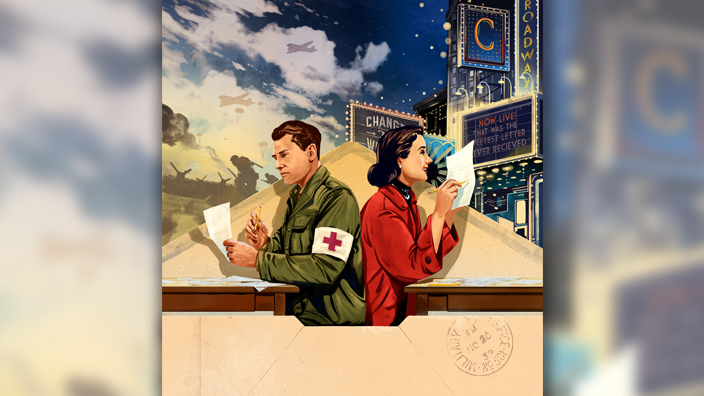Americans have relied on USPS more than ever during the coronavirus pandemic — to deliver prescription medications, ballots, online purchases and much more.
But can the Postal Service bring drama to your mailbox, too?
The answer is a resounding “yes” from a number of theater artists who’ve turned to the U.S. Mail to connect with audiences who’ve been forced to stay away from darkened stages over the past year.
With names like Post Theatrical, Artistic Stamp, Love Letter Experience and P.S., the resourceful projects have looked beyond expected alternatives — such as streaming video, actors performing remotely via Zoom, and outdoor productions — and found surprising ways to create theatrical experiences by mail.
Arena Stage in Washington, DC, had an ideal jumping-off point for its Love Letter Experience: the 2019 world premiere of Tony Award-winning playwright Ken Ludwig’s “Dear Jack, Dear Louise,” which chronicles the romance between two pen pals — characters based on his parents — during World War II.
The company subsequently worked with Ludwig to adapt the play, which is built entirely around letters exchanged between Army doctor Jack and aspiring actress Louise. The narrative has been condensed into nine mailings that started going out to over 1,000 ticket buyers in March.
Arena’s props department simulated the couple’s handwritten and typed letters, as well as telegrams and mementos such as a Broadway ticket stub, and staffers even relied on historic images from the Smithsonian’s National Postal Museum to ensure that homages to 1940s-era stamps were convincing.
Teresa Sapien, the company’s casting director and line producer, who guided Love Letter Experience to fruition, said she drew inspiration for the project from correspondence in her own life.
“I’ve always received cards and letters from my friends,” Sapien said. “When the pandemic started, it ramped up even more. I’ve looked forward to getting mail from them, and it inspired me to think of new ways to connect with our audiences.”
While Arena has explored film and streaming options — which can bring a host of technical and contractual complexities — for customers at home, the case for a mail-based experience was compelling.
“It’s a tangible piece of art audiences can see, hold and share,” said Sapien. “Plus the project has given our artisans work. It’s really captured the imagination of the public, and it’s exciting to add this type of work to our repertoire.”
Elsewhere, Pittsburgh-based Post Theatrical — billed as “a national wave of plays by mail” — represents a globe-spanning group of companies and individual artists who’ve combined forces to create 13 experiences involving letters, objects and multimedia elements.
Among current offerings are “Capricorn 29,” described as a “digital experience about the tyranny and utility of age-based milestones,” in the form of an “elaborate escape fantasy” inspired by a happy-29th-birthday card received in the mail; and “The Mailbox,” which tantalizingly asks, “What happens when all of the mailboxes in the world disappear overnight?”
Also noteworthy is the sold-out P.S. project, from the offbeat New York City company Ars Nova, which promised a year’s worth of “intimate storytelling,” beginning last November, in the form of correspondence between two childhood friends.
Bonded by their experiences growing up as people of color in small-town Oregon, they are now affected by present-day challenges of the nation’s pandemic life and social reckoning.
The story’s finale is planned as a live performance to be scheduled after Ars Nova can safely reopen.
It isn’t just larger cities, though, where theater by mail can thrive.
Artistic Stamp, for example, is led by married directors West Hyler and Shelley Butler, who run it from their home in Greenville, SC.
They started the project after participating in a conference that challenged theatermakers to embrace new storytelling forms in the wake of pandemic closures of live performance venues.
Artistic Stamp emphasizes choose-your-own-adventure-style interactivity, currently offering four mail-based plays that hinge on ticket buyers writing back to the characters they’ve received letters from, potentially affecting story arcs that develop in up to six letters sent out over several months.
Subjects include a fantastical Shakespeare-inspired mystery, a historical adventure with young Ida B. Wells in the post-Civil War South, a contemporary journey through Shanghai to search for an ancient mythical gateway, and a whimsical animal tale for young audiences.
Hyler and Butler have been working full time on the project, which has over 800 customers and relies on a small national army of playwrights, actors and others to support it.
(Not to mention local postal employees, who got a shout-out as “so phenomenal” from Hyler in American Theatre magazine.)
Each actor corresponds individually with a recipient, improvising within an overview created by the playwright, and more than 6,500 letters have been sent and received.
“People have been very vulnerable with us,” said Hyler. “The experience can be intimate, personal and incredibly beautiful. Audience members are fascinating. After so many years where you perceive them only from the stage, as just sitting in the theater, I never would have imagined the central role they’re playing for us now. They have so many interesting stories of their own to tell.”
The couple is excited to encourage not only the theater industry, but USPS itself, in trying times.
“We’ve learned how important the Postal Service is,” Hyler observed. “When you go the Post Office every day, you see how essential it is for individuals from all walks of life. It’s hugely important for people’s well-being.”
Share your feedback at uspslink@usps.gov. Your comments could be included in the “Mailbag” column.



